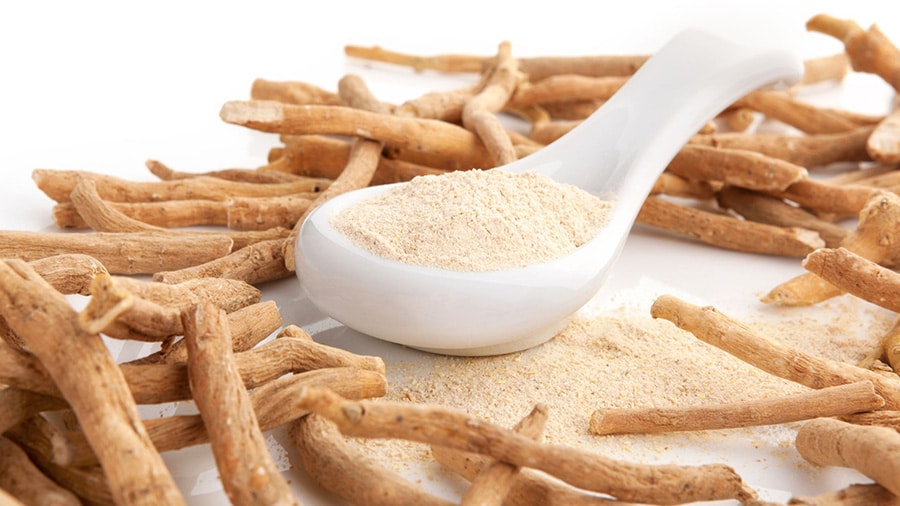Ashwagandha, a word that may not mean anything to you. However, this plant originating from Asia is used by many bodybuilders for its multiple virtues. Increased muscle strength, improved physical recovery and reduced stress are all benefits offered by this food supplement used for centuries. In this article, discover the benefits of ashwagandha in bodybuilding.
What is ashwagandha?
Ashwagandha (ashwagandha withania somnifera for its full scientific name), is a plant native to India. Also known as Indian ginseng, it has been used for several thousand years in Ayurvedic medicine, the traditional Indian medicine.
If the root of this plant is so popular since the dawn of time, it is because it is known for its numerous benefits. It has antioxidant, revitalizing, strengthening and adaptogenic properties. In short, ashwagandha helps the body to better resist to stressful situations or exceptional effort.
Let's take a closer look at how ashwagandha can be useful for weight trainers.
Why use ashwagandha in bodybuilding?
Several studies have looked at the effects of ashwagandha on muscle gain athletes.
The initial findings are more than promising, and will need to be confirmed by further research.
Strength gain and muscle development
A few studies have analyzed the relationship between ashwagandha and muscular growth. The one published in the Journal of the International Society of Sports Nutrition (JISSN) is undoubtedly the most striking.
She followed the progress of two groups of beginners (one consuming ashwagandha, the other not) during bench press and leg extension training.
At the end of the 8-week practice, the researchers concluded that the ashwagandha supplementation group had significant results in several areas:
- Strength gain;
- Muscle volume gain in the arms and pectoral muscles;
- Stabilization of CPK (creatine kinase) levels and reduction of muscle damage;
- Increase in testosterone level ;
- Improved body composition, with a reduction in body fat, in favor of a lean muscle mass.
Another study confirmed these results, particularly in terms of power take-off and muscle hypertrophy. This time she observed experienced exercisers following a weight training program consisting of bench press and squat.
On the other hand, scientists are not yet able to explain precisely the mechanisms of ashwagandha in muscle building.
Further studies are needed to better understand the effects of Indian ginseng on the human body and to confirm the previous conclusions.
Reduced stress and improved recovery
In addition to helping build muscle, ashwagandha has a positive effect on the nervous system and allows to sleep better.
In concrete terms, this supplement has the ability to reduce your cortisol levela stress hormone with catabolic effects.
By reducing your stress level, you will sleep better. And as you now know, a quality sleep is essential to optimize your muscle recovery between your weight training or fitness workouts.
Improvement of endurance
Indian ginseng also has the ability to increase the maximum amount of oxygen that can be used by the body and muscles during physical effort. This is the famous VO2 max.
The higher this VO2 max is, the more an athlete will be able to maintain a high intensity and increase its performance. This effect is therefore particularly interesting for all physical activities that require cardio, but also in the context of the practice of weight training.
How to take ashwagandha?
As you can see, whether you are a beginner or an advanced athlete, it can be interesting to take ashwagandha for weight gain or for weight loss.
The dose of ashwagandha per day recommended is between 500 milligrams and 1.5 grams. For my personal intake, I use ashwagandha from Prozisavailable in capsules. Depending on your preferences, you can also find this food supplement in powder form.
Of course, taking supplements must be accompanied by a balanced diet, with a caloric intake adapted to your needs.
On the subject of when to take ashwagandha to maximize its absorption, opinions differ. Some say it is better to take it at breakfast and avoid consuming it before bedtime. Others say that this does not change anything for the assimilation.
In terms of side effects, ashwagandha is safe within the previously recommended dosage. To avoid digestive pain, I invite you to increase the dose gradually.
In case of pregnancy, allergies, diabetes or if you are taking antidepressants, it is better to avoid taking them (but this is true for most food supplements). Do not hesitate to consult your doctor if you have any doubt.

To conclude
While several studies have demonstrated the positive effects of ashwagandha on sports and muscle building, more research is needed to fully understand the mechanisms of this plant. What about you, have you ever tried ashwagandha supplementation? Tell me in the comments if it has helped you to gain strength or if you have noticed beneficial effects on your performance in the weight room.






